Detailed Report: Business Environment Analysis of Nestle Company
VerifiedAdded on 2020/01/28
|17
|6229
|86
Report
AI Summary
This report provides a comprehensive analysis of Nestle Company's business environment. It explores the purposes of different organizational types, focusing on public, private, and charitable sectors, with Nestle as a key example of a private entity. The report details how organizations meet stakeholder objectives, including employees, customers, government, and investors, and outlines the responsibilities and strategies organizations employ, such as health and safety, ethical considerations, and environmental concerns. Furthermore, it examines various economic systems, including free market, centrally planned, and mixed economies, and assesses the impact of monetary and fiscal policies on business operations. The report also analyzes the influence of competition policies and regulatory mechanisms, like customer services and environmental policies, on business objectives and delves into pricing and output decisions within different market structures.
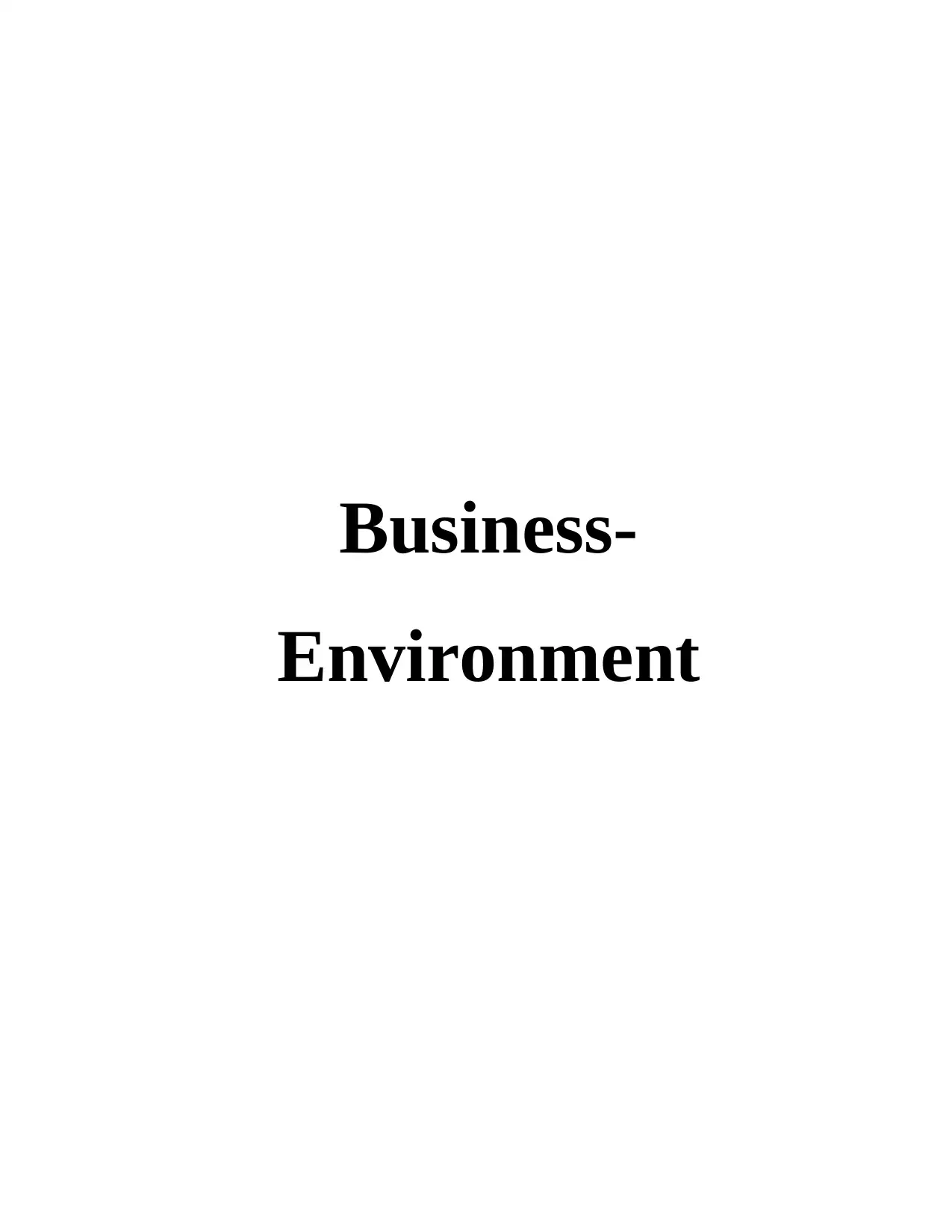
Business-
Environment
Environment
Paraphrase This Document
Need a fresh take? Get an instant paraphrase of this document with our AI Paraphraser
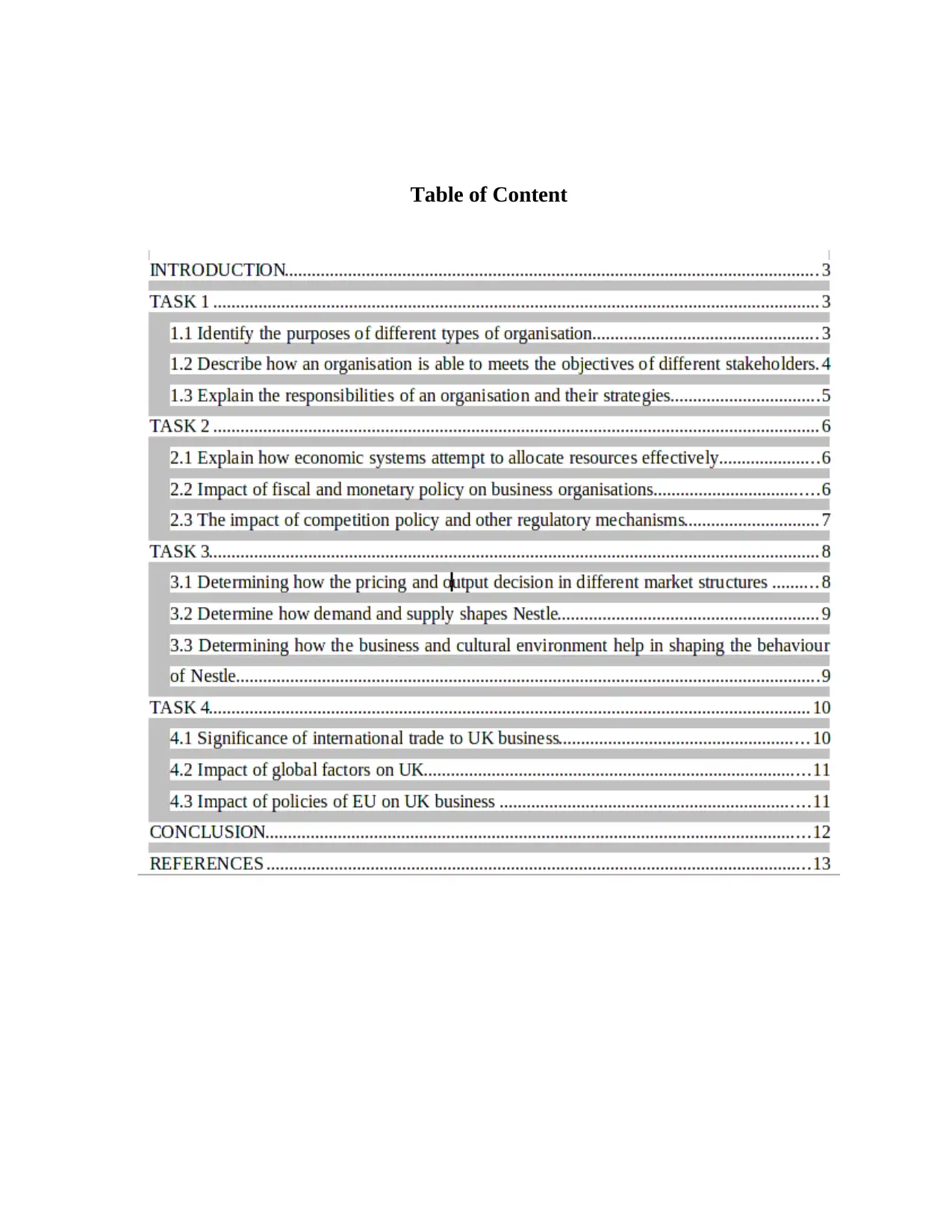
Table of Content
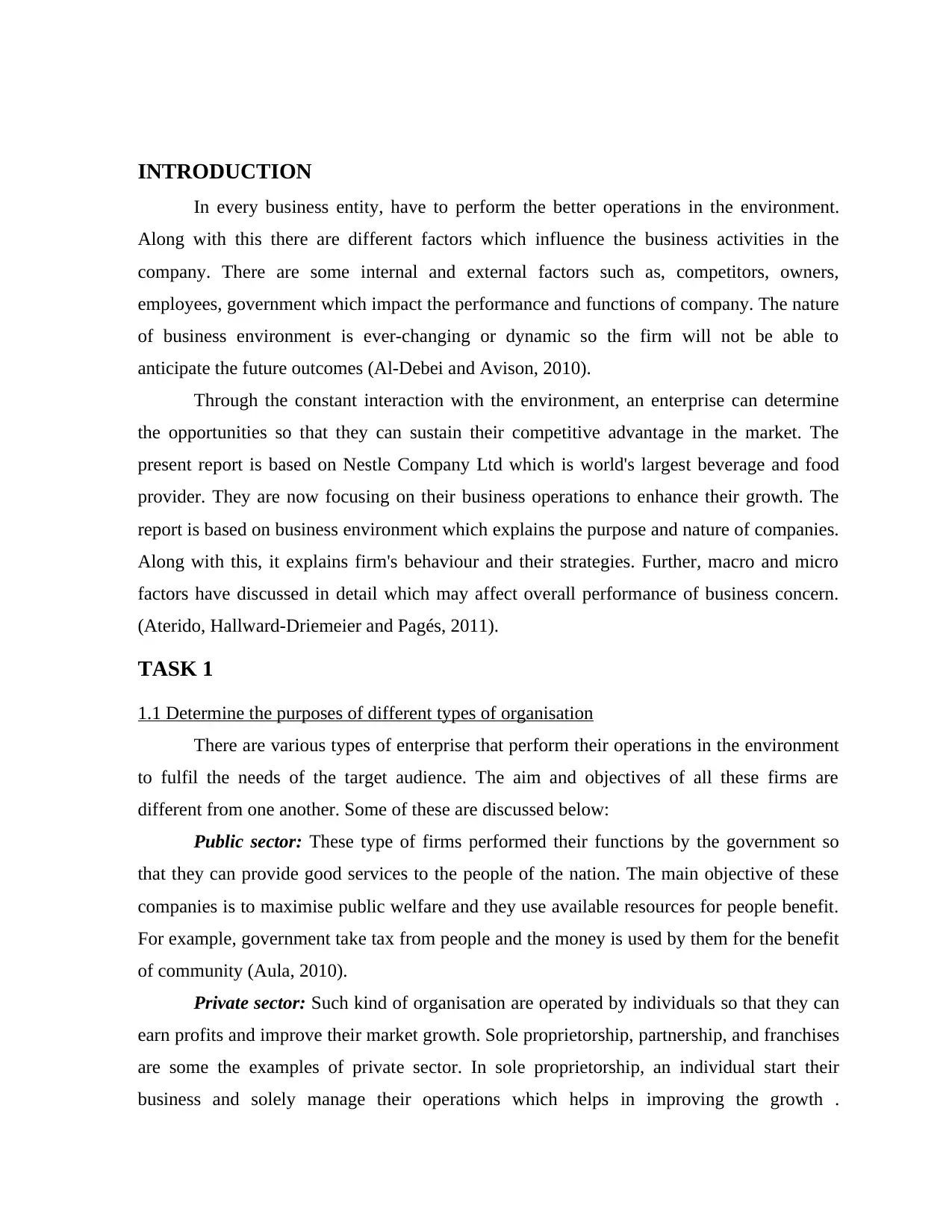
INTRODUCTION
In every business entity, have to perform the better operations in the environment.
Along with this there are different factors which influence the business activities in the
company. There are some internal and external factors such as, competitors, owners,
employees, government which impact the performance and functions of company. The nature
of business environment is ever-changing or dynamic so the firm will not be able to
anticipate the future outcomes (Al-Debei and Avison, 2010).
Through the constant interaction with the environment, an enterprise can determine
the opportunities so that they can sustain their competitive advantage in the market. The
present report is based on Nestle Company Ltd which is world's largest beverage and food
provider. They are now focusing on their business operations to enhance their growth. The
report is based on business environment which explains the purpose and nature of companies.
Along with this, it explains firm's behaviour and their strategies. Further, macro and micro
factors have discussed in detail which may affect overall performance of business concern.
(Aterido, Hallward-Driemeier and Pagés, 2011).
TASK 1
1.1 Determine the purposes of different types of organisation
There are various types of enterprise that perform their operations in the environment
to fulfil the needs of the target audience. The aim and objectives of all these firms are
different from one another. Some of these are discussed below:
Public sector: These type of firms performed their functions by the government so
that they can provide good services to the people of the nation. The main objective of these
companies is to maximise public welfare and they use available resources for people benefit.
For example, government take tax from people and the money is used by them for the benefit
of community (Aula, 2010).
Private sector: Such kind of organisation are operated by individuals so that they can
earn profits and improve their market growth. Sole proprietorship, partnership, and franchises
are some the examples of private sector. In sole proprietorship, an individual start their
business and solely manage their operations which helps in improving the growth .
In every business entity, have to perform the better operations in the environment.
Along with this there are different factors which influence the business activities in the
company. There are some internal and external factors such as, competitors, owners,
employees, government which impact the performance and functions of company. The nature
of business environment is ever-changing or dynamic so the firm will not be able to
anticipate the future outcomes (Al-Debei and Avison, 2010).
Through the constant interaction with the environment, an enterprise can determine
the opportunities so that they can sustain their competitive advantage in the market. The
present report is based on Nestle Company Ltd which is world's largest beverage and food
provider. They are now focusing on their business operations to enhance their growth. The
report is based on business environment which explains the purpose and nature of companies.
Along with this, it explains firm's behaviour and their strategies. Further, macro and micro
factors have discussed in detail which may affect overall performance of business concern.
(Aterido, Hallward-Driemeier and Pagés, 2011).
TASK 1
1.1 Determine the purposes of different types of organisation
There are various types of enterprise that perform their operations in the environment
to fulfil the needs of the target audience. The aim and objectives of all these firms are
different from one another. Some of these are discussed below:
Public sector: These type of firms performed their functions by the government so
that they can provide good services to the people of the nation. The main objective of these
companies is to maximise public welfare and they use available resources for people benefit.
For example, government take tax from people and the money is used by them for the benefit
of community (Aula, 2010).
Private sector: Such kind of organisation are operated by individuals so that they can
earn profits and improve their market growth. Sole proprietorship, partnership, and franchises
are some the examples of private sector. In sole proprietorship, an individual start their
business and solely manage their operations which helps in improving the growth .
⊘ This is a preview!⊘
Do you want full access?
Subscribe today to unlock all pages.

Trusted by 1+ million students worldwide
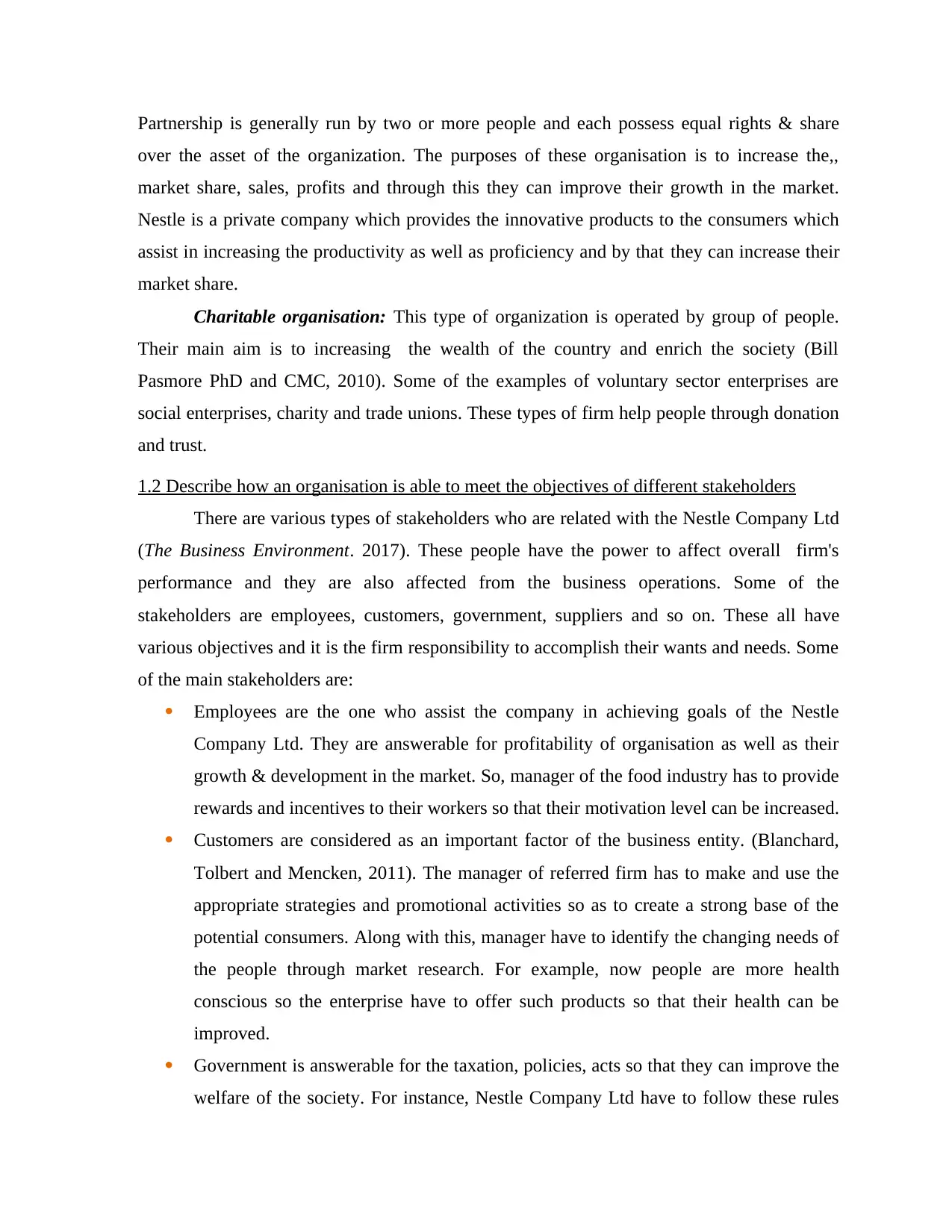
Partnership is generally run by two or more people and each possess equal rights & share
over the asset of the organization. The purposes of these organisation is to increase the,,
market share, sales, profits and through this they can improve their growth in the market.
Nestle is a private company which provides the innovative products to the consumers which
assist in increasing the productivity as well as proficiency and by that they can increase their
market share.
Charitable organisation: This type of organization is operated by group of people.
Their main aim is to increasing the wealth of the country and enrich the society (Bill
Pasmore PhD and CMC, 2010). Some of the examples of voluntary sector enterprises are
social enterprises, charity and trade unions. These types of firm help people through donation
and trust.
1.2 Describe how an organisation is able to meet the objectives of different stakeholders
There are various types of stakeholders who are related with the Nestle Company Ltd
(The Business Environment. 2017). These people have the power to affect overall firm's
performance and they are also affected from the business operations. Some of the
stakeholders are employees, customers, government, suppliers and so on. These all have
various objectives and it is the firm responsibility to accomplish their wants and needs. Some
of the main stakeholders are:
Employees are the one who assist the company in achieving goals of the Nestle
Company Ltd. They are answerable for profitability of organisation as well as their
growth & development in the market. So, manager of the food industry has to provide
rewards and incentives to their workers so that their motivation level can be increased.
Customers are considered as an important factor of the business entity. (Blanchard,
Tolbert and Mencken, 2011). The manager of referred firm has to make and use the
appropriate strategies and promotional activities so as to create a strong base of the
potential consumers. Along with this, manager have to identify the changing needs of
the people through market research. For example, now people are more health
conscious so the enterprise have to offer such products so that their health can be
improved.
Government is answerable for the taxation, policies, acts so that they can improve the
welfare of the society. For instance, Nestle Company Ltd have to follow these rules
over the asset of the organization. The purposes of these organisation is to increase the,,
market share, sales, profits and through this they can improve their growth in the market.
Nestle is a private company which provides the innovative products to the consumers which
assist in increasing the productivity as well as proficiency and by that they can increase their
market share.
Charitable organisation: This type of organization is operated by group of people.
Their main aim is to increasing the wealth of the country and enrich the society (Bill
Pasmore PhD and CMC, 2010). Some of the examples of voluntary sector enterprises are
social enterprises, charity and trade unions. These types of firm help people through donation
and trust.
1.2 Describe how an organisation is able to meet the objectives of different stakeholders
There are various types of stakeholders who are related with the Nestle Company Ltd
(The Business Environment. 2017). These people have the power to affect overall firm's
performance and they are also affected from the business operations. Some of the
stakeholders are employees, customers, government, suppliers and so on. These all have
various objectives and it is the firm responsibility to accomplish their wants and needs. Some
of the main stakeholders are:
Employees are the one who assist the company in achieving goals of the Nestle
Company Ltd. They are answerable for profitability of organisation as well as their
growth & development in the market. So, manager of the food industry has to provide
rewards and incentives to their workers so that their motivation level can be increased.
Customers are considered as an important factor of the business entity. (Blanchard,
Tolbert and Mencken, 2011). The manager of referred firm has to make and use the
appropriate strategies and promotional activities so as to create a strong base of the
potential consumers. Along with this, manager have to identify the changing needs of
the people through market research. For example, now people are more health
conscious so the enterprise have to offer such products so that their health can be
improved.
Government is answerable for the taxation, policies, acts so that they can improve the
welfare of the society. For instance, Nestle Company Ltd have to follow these rules
Paraphrase This Document
Need a fresh take? Get an instant paraphrase of this document with our AI Paraphraser
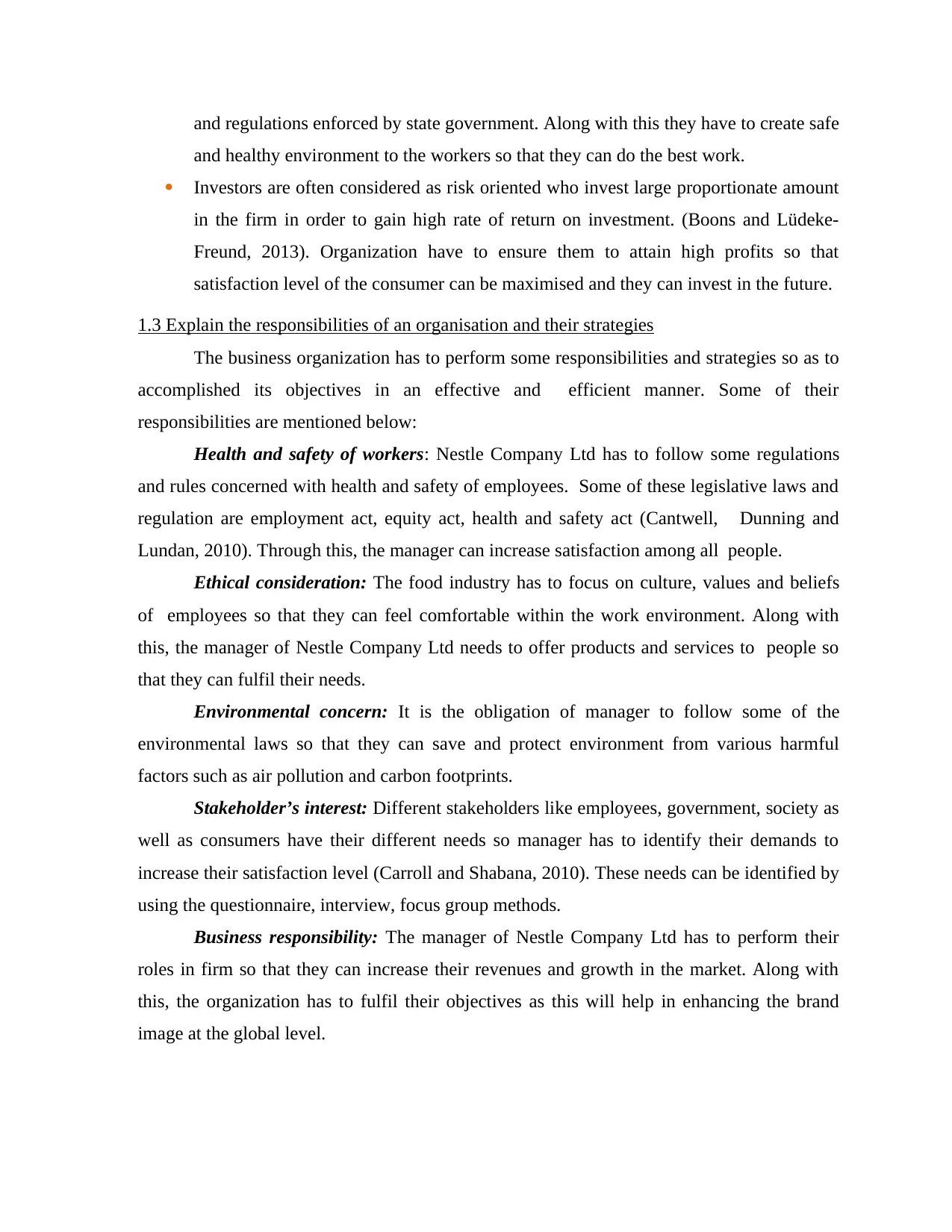
and regulations enforced by state government. Along with this they have to create safe
and healthy environment to the workers so that they can do the best work.
Investors are often considered as risk oriented who invest large proportionate amount
in the firm in order to gain high rate of return on investment. (Boons and Lüdeke-
Freund, 2013). Organization have to ensure them to attain high profits so that
satisfaction level of the consumer can be maximised and they can invest in the future.
1.3 Explain the responsibilities of an organisation and their strategies
The business organization has to perform some responsibilities and strategies so as to
accomplished its objectives in an effective and efficient manner. Some of their
responsibilities are mentioned below:
Health and safety of workers: Nestle Company Ltd has to follow some regulations
and rules concerned with health and safety of employees. Some of these legislative laws and
regulation are employment act, equity act, health and safety act (Cantwell, Dunning and
Lundan, 2010). Through this, the manager can increase satisfaction among all people.
Ethical consideration: The food industry has to focus on culture, values and beliefs
of employees so that they can feel comfortable within the work environment. Along with
this, the manager of Nestle Company Ltd needs to offer products and services to people so
that they can fulfil their needs.
Environmental concern: It is the obligation of manager to follow some of the
environmental laws so that they can save and protect environment from various harmful
factors such as air pollution and carbon footprints.
Stakeholder’s interest: Different stakeholders like employees, government, society as
well as consumers have their different needs so manager has to identify their demands to
increase their satisfaction level (Carroll and Shabana, 2010). These needs can be identified by
using the questionnaire, interview, focus group methods.
Business responsibility: The manager of Nestle Company Ltd has to perform their
roles in firm so that they can increase their revenues and growth in the market. Along with
this, the organization has to fulfil their objectives as this will help in enhancing the brand
image at the global level.
and healthy environment to the workers so that they can do the best work.
Investors are often considered as risk oriented who invest large proportionate amount
in the firm in order to gain high rate of return on investment. (Boons and Lüdeke-
Freund, 2013). Organization have to ensure them to attain high profits so that
satisfaction level of the consumer can be maximised and they can invest in the future.
1.3 Explain the responsibilities of an organisation and their strategies
The business organization has to perform some responsibilities and strategies so as to
accomplished its objectives in an effective and efficient manner. Some of their
responsibilities are mentioned below:
Health and safety of workers: Nestle Company Ltd has to follow some regulations
and rules concerned with health and safety of employees. Some of these legislative laws and
regulation are employment act, equity act, health and safety act (Cantwell, Dunning and
Lundan, 2010). Through this, the manager can increase satisfaction among all people.
Ethical consideration: The food industry has to focus on culture, values and beliefs
of employees so that they can feel comfortable within the work environment. Along with
this, the manager of Nestle Company Ltd needs to offer products and services to people so
that they can fulfil their needs.
Environmental concern: It is the obligation of manager to follow some of the
environmental laws so that they can save and protect environment from various harmful
factors such as air pollution and carbon footprints.
Stakeholder’s interest: Different stakeholders like employees, government, society as
well as consumers have their different needs so manager has to identify their demands to
increase their satisfaction level (Carroll and Shabana, 2010). These needs can be identified by
using the questionnaire, interview, focus group methods.
Business responsibility: The manager of Nestle Company Ltd has to perform their
roles in firm so that they can increase their revenues and growth in the market. Along with
this, the organization has to fulfil their objectives as this will help in enhancing the brand
image at the global level.
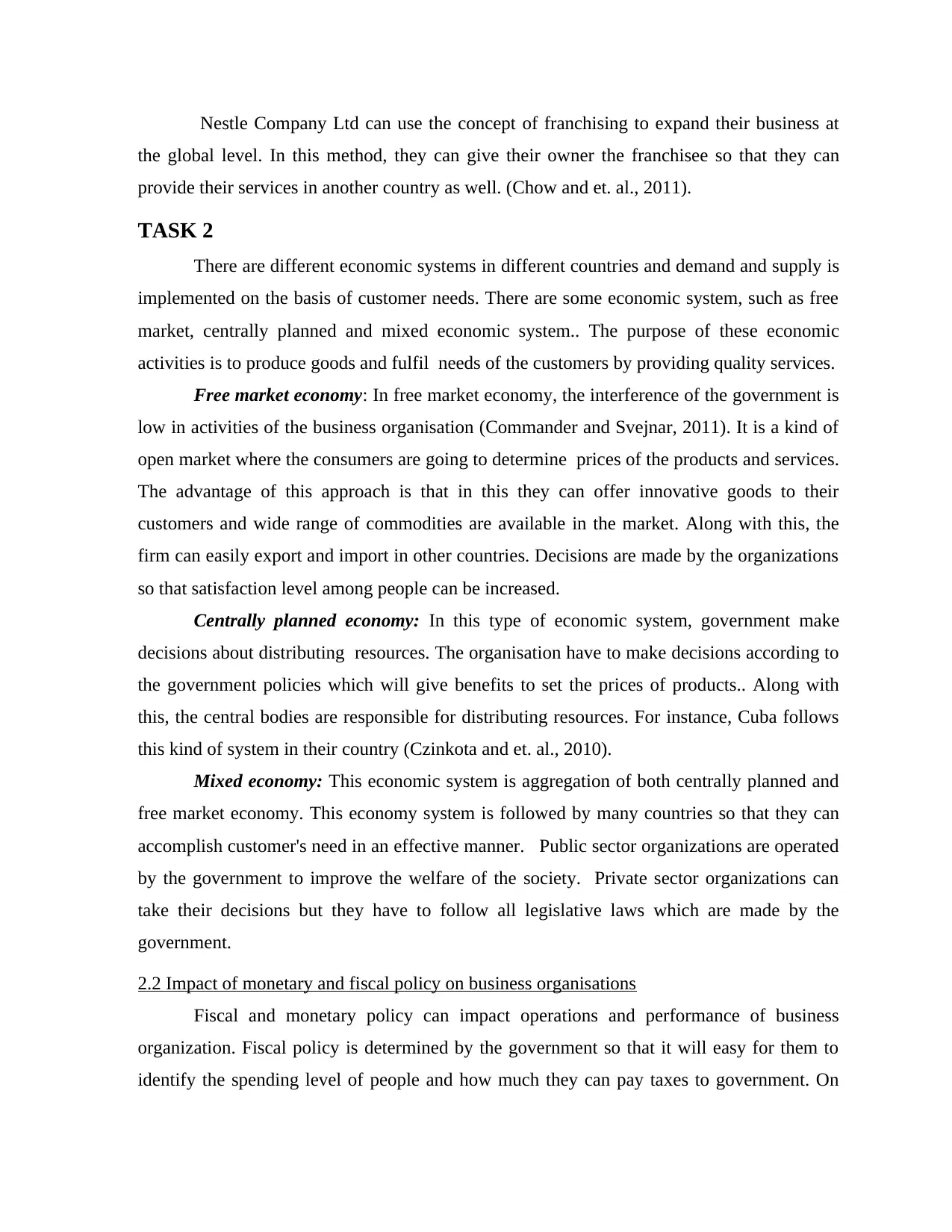
Nestle Company Ltd can use the concept of franchising to expand their business at
the global level. In this method, they can give their owner the franchisee so that they can
provide their services in another country as well. (Chow and et. al., 2011).
TASK 2
There are different economic systems in different countries and demand and supply is
implemented on the basis of customer needs. There are some economic system, such as free
market, centrally planned and mixed economic system.. The purpose of these economic
activities is to produce goods and fulfil needs of the customers by providing quality services.
Free market economy: In free market economy, the interference of the government is
low in activities of the business organisation (Commander and Svejnar, 2011). It is a kind of
open market where the consumers are going to determine prices of the products and services.
The advantage of this approach is that in this they can offer innovative goods to their
customers and wide range of commodities are available in the market. Along with this, the
firm can easily export and import in other countries. Decisions are made by the organizations
so that satisfaction level among people can be increased.
Centrally planned economy: In this type of economic system, government make
decisions about distributing resources. The organisation have to make decisions according to
the government policies which will give benefits to set the prices of products.. Along with
this, the central bodies are responsible for distributing resources. For instance, Cuba follows
this kind of system in their country (Czinkota and et. al., 2010).
Mixed economy: This economic system is aggregation of both centrally planned and
free market economy. This economy system is followed by many countries so that they can
accomplish customer's need in an effective manner. Public sector organizations are operated
by the government to improve the welfare of the society. Private sector organizations can
take their decisions but they have to follow all legislative laws which are made by the
government.
2.2 Impact of monetary and fiscal policy on business organisations
Fiscal and monetary policy can impact operations and performance of business
organization. Fiscal policy is determined by the government so that it will easy for them to
identify the spending level of people and how much they can pay taxes to government. On
the global level. In this method, they can give their owner the franchisee so that they can
provide their services in another country as well. (Chow and et. al., 2011).
TASK 2
There are different economic systems in different countries and demand and supply is
implemented on the basis of customer needs. There are some economic system, such as free
market, centrally planned and mixed economic system.. The purpose of these economic
activities is to produce goods and fulfil needs of the customers by providing quality services.
Free market economy: In free market economy, the interference of the government is
low in activities of the business organisation (Commander and Svejnar, 2011). It is a kind of
open market where the consumers are going to determine prices of the products and services.
The advantage of this approach is that in this they can offer innovative goods to their
customers and wide range of commodities are available in the market. Along with this, the
firm can easily export and import in other countries. Decisions are made by the organizations
so that satisfaction level among people can be increased.
Centrally planned economy: In this type of economic system, government make
decisions about distributing resources. The organisation have to make decisions according to
the government policies which will give benefits to set the prices of products.. Along with
this, the central bodies are responsible for distributing resources. For instance, Cuba follows
this kind of system in their country (Czinkota and et. al., 2010).
Mixed economy: This economic system is aggregation of both centrally planned and
free market economy. This economy system is followed by many countries so that they can
accomplish customer's need in an effective manner. Public sector organizations are operated
by the government to improve the welfare of the society. Private sector organizations can
take their decisions but they have to follow all legislative laws which are made by the
government.
2.2 Impact of monetary and fiscal policy on business organisations
Fiscal and monetary policy can impact operations and performance of business
organization. Fiscal policy is determined by the government so that it will easy for them to
identify the spending level of people and how much they can pay taxes to government. On
⊘ This is a preview!⊘
Do you want full access?
Subscribe today to unlock all pages.

Trusted by 1+ million students worldwide
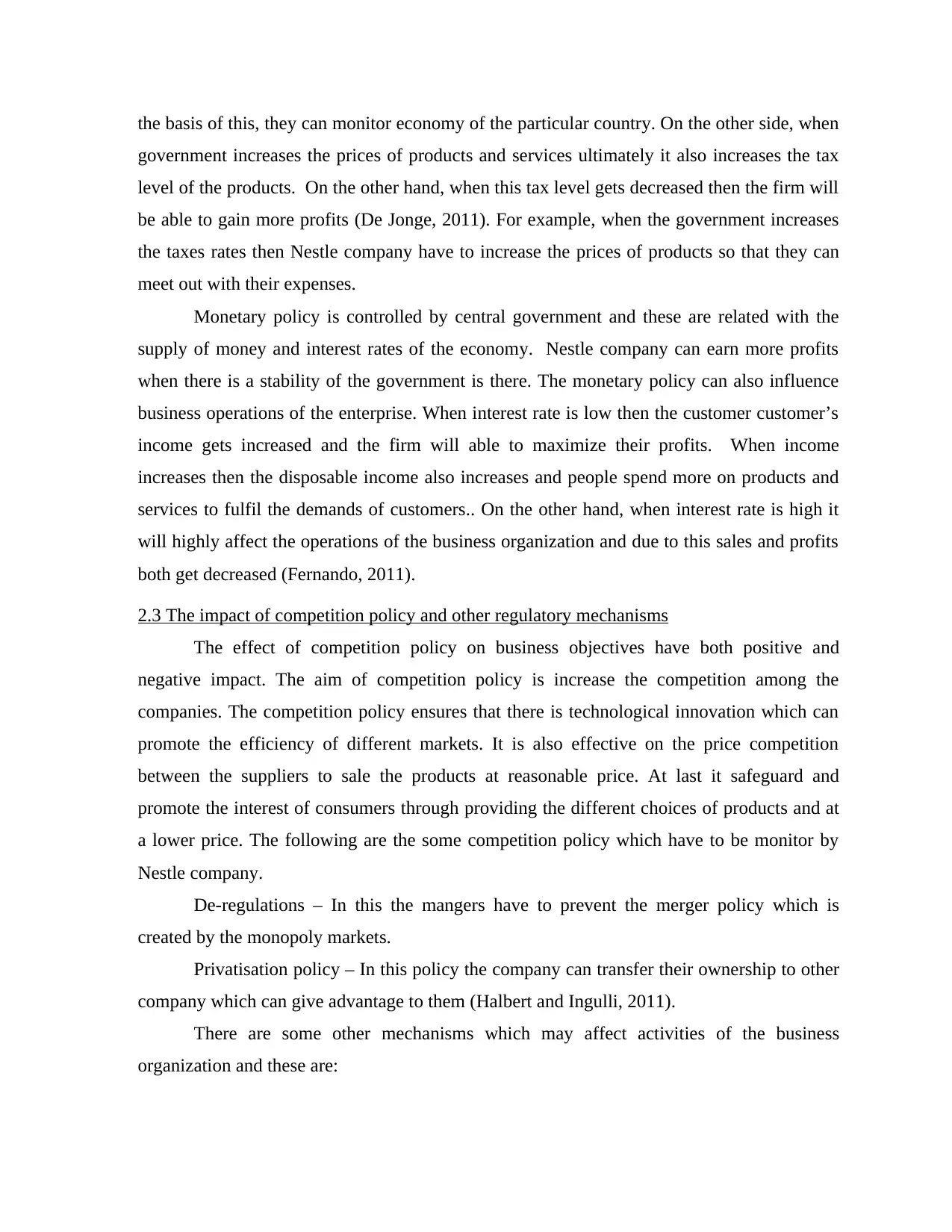
the basis of this, they can monitor economy of the particular country. On the other side, when
government increases the prices of products and services ultimately it also increases the tax
level of the products. On the other hand, when this tax level gets decreased then the firm will
be able to gain more profits (De Jonge, 2011). For example, when the government increases
the taxes rates then Nestle company have to increase the prices of products so that they can
meet out with their expenses.
Monetary policy is controlled by central government and these are related with the
supply of money and interest rates of the economy. Nestle company can earn more profits
when there is a stability of the government is there. The monetary policy can also influence
business operations of the enterprise. When interest rate is low then the customer customer’s
income gets increased and the firm will able to maximize their profits. When income
increases then the disposable income also increases and people spend more on products and
services to fulfil the demands of customers.. On the other hand, when interest rate is high it
will highly affect the operations of the business organization and due to this sales and profits
both get decreased (Fernando, 2011).
2.3 The impact of competition policy and other regulatory mechanisms
The effect of competition policy on business objectives have both positive and
negative impact. The aim of competition policy is increase the competition among the
companies. The competition policy ensures that there is technological innovation which can
promote the efficiency of different markets. It is also effective on the price competition
between the suppliers to sale the products at reasonable price. At last it safeguard and
promote the interest of consumers through providing the different choices of products and at
a lower price. The following are the some competition policy which have to be monitor by
Nestle company.
De-regulations – In this the mangers have to prevent the merger policy which is
created by the monopoly markets.
Privatisation policy – In this policy the company can transfer their ownership to other
company which can give advantage to them (Halbert and Ingulli, 2011).
There are some other mechanisms which may affect activities of the business
organization and these are:
government increases the prices of products and services ultimately it also increases the tax
level of the products. On the other hand, when this tax level gets decreased then the firm will
be able to gain more profits (De Jonge, 2011). For example, when the government increases
the taxes rates then Nestle company have to increase the prices of products so that they can
meet out with their expenses.
Monetary policy is controlled by central government and these are related with the
supply of money and interest rates of the economy. Nestle company can earn more profits
when there is a stability of the government is there. The monetary policy can also influence
business operations of the enterprise. When interest rate is low then the customer customer’s
income gets increased and the firm will able to maximize their profits. When income
increases then the disposable income also increases and people spend more on products and
services to fulfil the demands of customers.. On the other hand, when interest rate is high it
will highly affect the operations of the business organization and due to this sales and profits
both get decreased (Fernando, 2011).
2.3 The impact of competition policy and other regulatory mechanisms
The effect of competition policy on business objectives have both positive and
negative impact. The aim of competition policy is increase the competition among the
companies. The competition policy ensures that there is technological innovation which can
promote the efficiency of different markets. It is also effective on the price competition
between the suppliers to sale the products at reasonable price. At last it safeguard and
promote the interest of consumers through providing the different choices of products and at
a lower price. The following are the some competition policy which have to be monitor by
Nestle company.
De-regulations – In this the mangers have to prevent the merger policy which is
created by the monopoly markets.
Privatisation policy – In this policy the company can transfer their ownership to other
company which can give advantage to them (Halbert and Ingulli, 2011).
There are some other mechanisms which may affect activities of the business
organization and these are:
Paraphrase This Document
Need a fresh take? Get an instant paraphrase of this document with our AI Paraphraser
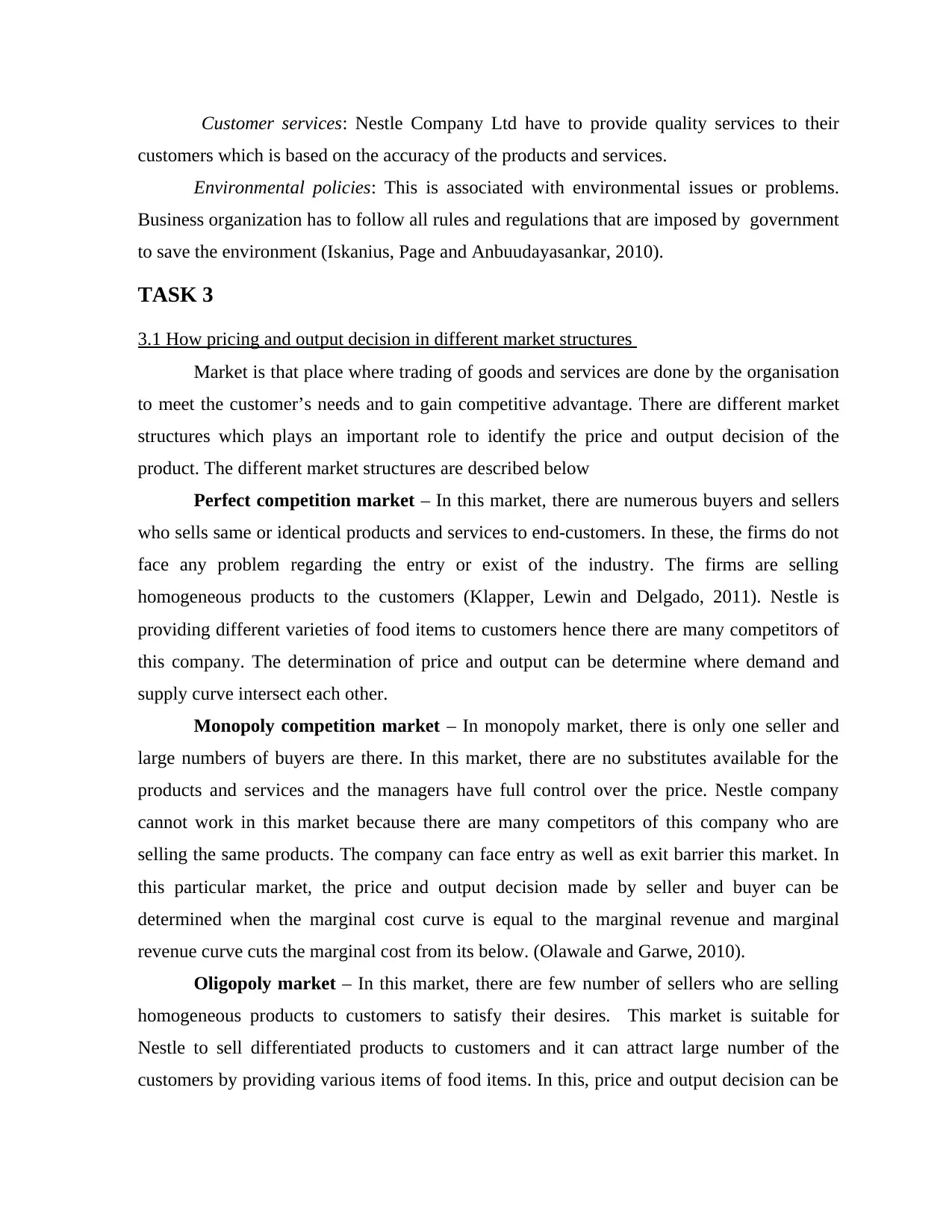
Customer services: Nestle Company Ltd have to provide quality services to their
customers which is based on the accuracy of the products and services.
Environmental policies: This is associated with environmental issues or problems.
Business organization has to follow all rules and regulations that are imposed by government
to save the environment (Iskanius, Page and Anbuudayasankar, 2010).
TASK 3
3.1 How pricing and output decision in different market structures
Market is that place where trading of goods and services are done by the organisation
to meet the customer’s needs and to gain competitive advantage. There are different market
structures which plays an important role to identify the price and output decision of the
product. The different market structures are described below
Perfect competition market – In this market, there are numerous buyers and sellers
who sells same or identical products and services to end-customers. In these, the firms do not
face any problem regarding the entry or exist of the industry. The firms are selling
homogeneous products to the customers (Klapper, Lewin and Delgado, 2011). Nestle is
providing different varieties of food items to customers hence there are many competitors of
this company. The determination of price and output can be determine where demand and
supply curve intersect each other.
Monopoly competition market – In monopoly market, there is only one seller and
large numbers of buyers are there. In this market, there are no substitutes available for the
products and services and the managers have full control over the price. Nestle company
cannot work in this market because there are many competitors of this company who are
selling the same products. The company can face entry as well as exit barrier this market. In
this particular market, the price and output decision made by seller and buyer can be
determined when the marginal cost curve is equal to the marginal revenue and marginal
revenue curve cuts the marginal cost from its below. (Olawale and Garwe, 2010).
Oligopoly market – In this market, there are few number of sellers who are selling
homogeneous products to customers to satisfy their desires. This market is suitable for
Nestle to sell differentiated products to customers and it can attract large number of the
customers by providing various items of food items. In this, price and output decision can be
customers which is based on the accuracy of the products and services.
Environmental policies: This is associated with environmental issues or problems.
Business organization has to follow all rules and regulations that are imposed by government
to save the environment (Iskanius, Page and Anbuudayasankar, 2010).
TASK 3
3.1 How pricing and output decision in different market structures
Market is that place where trading of goods and services are done by the organisation
to meet the customer’s needs and to gain competitive advantage. There are different market
structures which plays an important role to identify the price and output decision of the
product. The different market structures are described below
Perfect competition market – In this market, there are numerous buyers and sellers
who sells same or identical products and services to end-customers. In these, the firms do not
face any problem regarding the entry or exist of the industry. The firms are selling
homogeneous products to the customers (Klapper, Lewin and Delgado, 2011). Nestle is
providing different varieties of food items to customers hence there are many competitors of
this company. The determination of price and output can be determine where demand and
supply curve intersect each other.
Monopoly competition market – In monopoly market, there is only one seller and
large numbers of buyers are there. In this market, there are no substitutes available for the
products and services and the managers have full control over the price. Nestle company
cannot work in this market because there are many competitors of this company who are
selling the same products. The company can face entry as well as exit barrier this market. In
this particular market, the price and output decision made by seller and buyer can be
determined when the marginal cost curve is equal to the marginal revenue and marginal
revenue curve cuts the marginal cost from its below. (Olawale and Garwe, 2010).
Oligopoly market – In this market, there are few number of sellers who are selling
homogeneous products to customers to satisfy their desires. This market is suitable for
Nestle to sell differentiated products to customers and it can attract large number of the
customers by providing various items of food items. In this, price and output decision can be
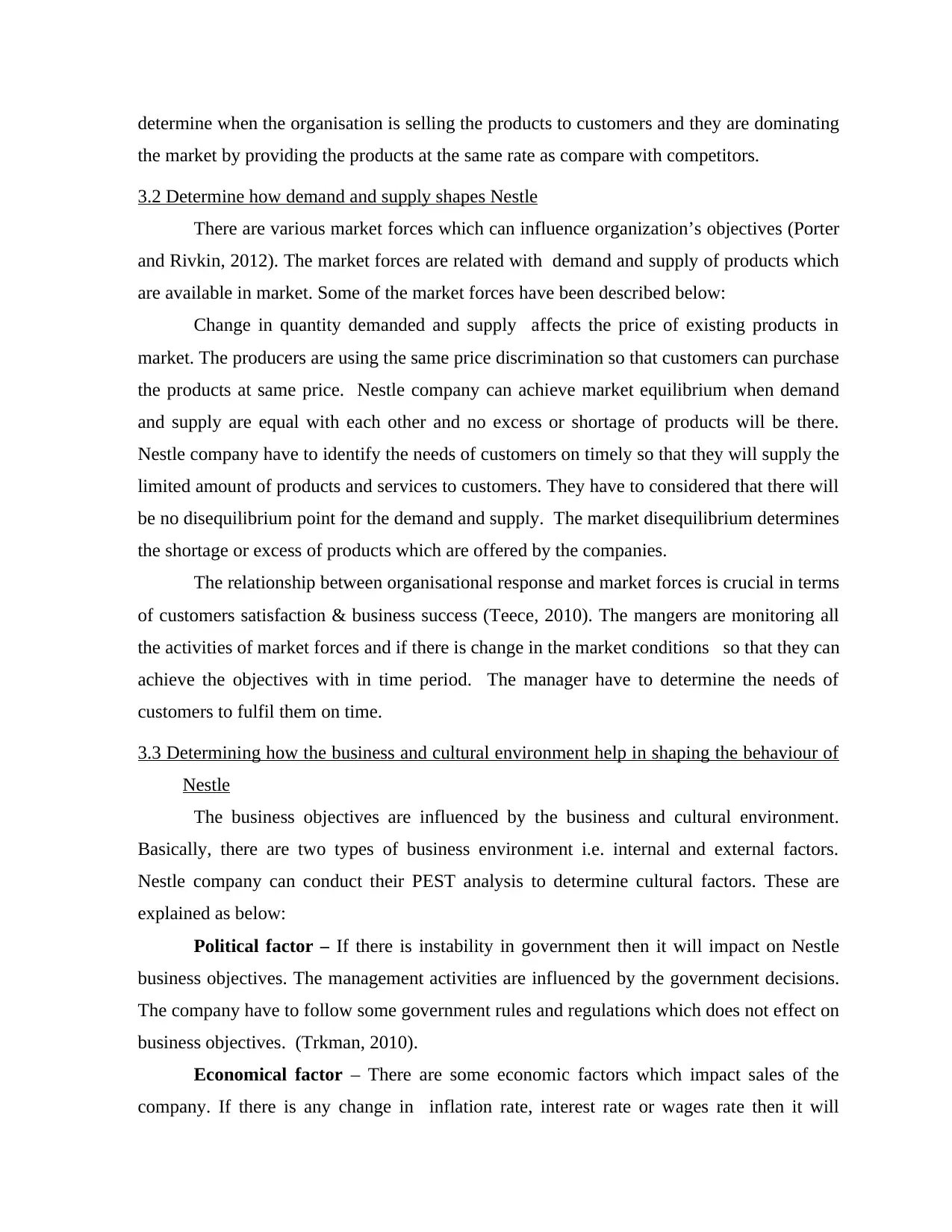
determine when the organisation is selling the products to customers and they are dominating
the market by providing the products at the same rate as compare with competitors.
3.2 Determine how demand and supply shapes Nestle
There are various market forces which can influence organization’s objectives (Porter
and Rivkin, 2012). The market forces are related with demand and supply of products which
are available in market. Some of the market forces have been described below:
Change in quantity demanded and supply affects the price of existing products in
market. The producers are using the same price discrimination so that customers can purchase
the products at same price. Nestle company can achieve market equilibrium when demand
and supply are equal with each other and no excess or shortage of products will be there.
Nestle company have to identify the needs of customers on timely so that they will supply the
limited amount of products and services to customers. They have to considered that there will
be no disequilibrium point for the demand and supply. The market disequilibrium determines
the shortage or excess of products which are offered by the companies.
The relationship between organisational response and market forces is crucial in terms
of customers satisfaction & business success (Teece, 2010). The mangers are monitoring all
the activities of market forces and if there is change in the market conditions so that they can
achieve the objectives with in time period. The manager have to determine the needs of
customers to fulfil them on time.
3.3 Determining how the business and cultural environment help in shaping the behaviour of
Nestle
The business objectives are influenced by the business and cultural environment.
Basically, there are two types of business environment i.e. internal and external factors.
Nestle company can conduct their PEST analysis to determine cultural factors. These are
explained as below:
Political factor – If there is instability in government then it will impact on Nestle
business objectives. The management activities are influenced by the government decisions.
The company have to follow some government rules and regulations which does not effect on
business objectives. (Trkman, 2010).
Economical factor – There are some economic factors which impact sales of the
company. If there is any change in inflation rate, interest rate or wages rate then it will
the market by providing the products at the same rate as compare with competitors.
3.2 Determine how demand and supply shapes Nestle
There are various market forces which can influence organization’s objectives (Porter
and Rivkin, 2012). The market forces are related with demand and supply of products which
are available in market. Some of the market forces have been described below:
Change in quantity demanded and supply affects the price of existing products in
market. The producers are using the same price discrimination so that customers can purchase
the products at same price. Nestle company can achieve market equilibrium when demand
and supply are equal with each other and no excess or shortage of products will be there.
Nestle company have to identify the needs of customers on timely so that they will supply the
limited amount of products and services to customers. They have to considered that there will
be no disequilibrium point for the demand and supply. The market disequilibrium determines
the shortage or excess of products which are offered by the companies.
The relationship between organisational response and market forces is crucial in terms
of customers satisfaction & business success (Teece, 2010). The mangers are monitoring all
the activities of market forces and if there is change in the market conditions so that they can
achieve the objectives with in time period. The manager have to determine the needs of
customers to fulfil them on time.
3.3 Determining how the business and cultural environment help in shaping the behaviour of
Nestle
The business objectives are influenced by the business and cultural environment.
Basically, there are two types of business environment i.e. internal and external factors.
Nestle company can conduct their PEST analysis to determine cultural factors. These are
explained as below:
Political factor – If there is instability in government then it will impact on Nestle
business objectives. The management activities are influenced by the government decisions.
The company have to follow some government rules and regulations which does not effect on
business objectives. (Trkman, 2010).
Economical factor – There are some economic factors which impact sales of the
company. If there is any change in inflation rate, interest rate or wages rate then it will
⊘ This is a preview!⊘
Do you want full access?
Subscribe today to unlock all pages.

Trusted by 1+ million students worldwide
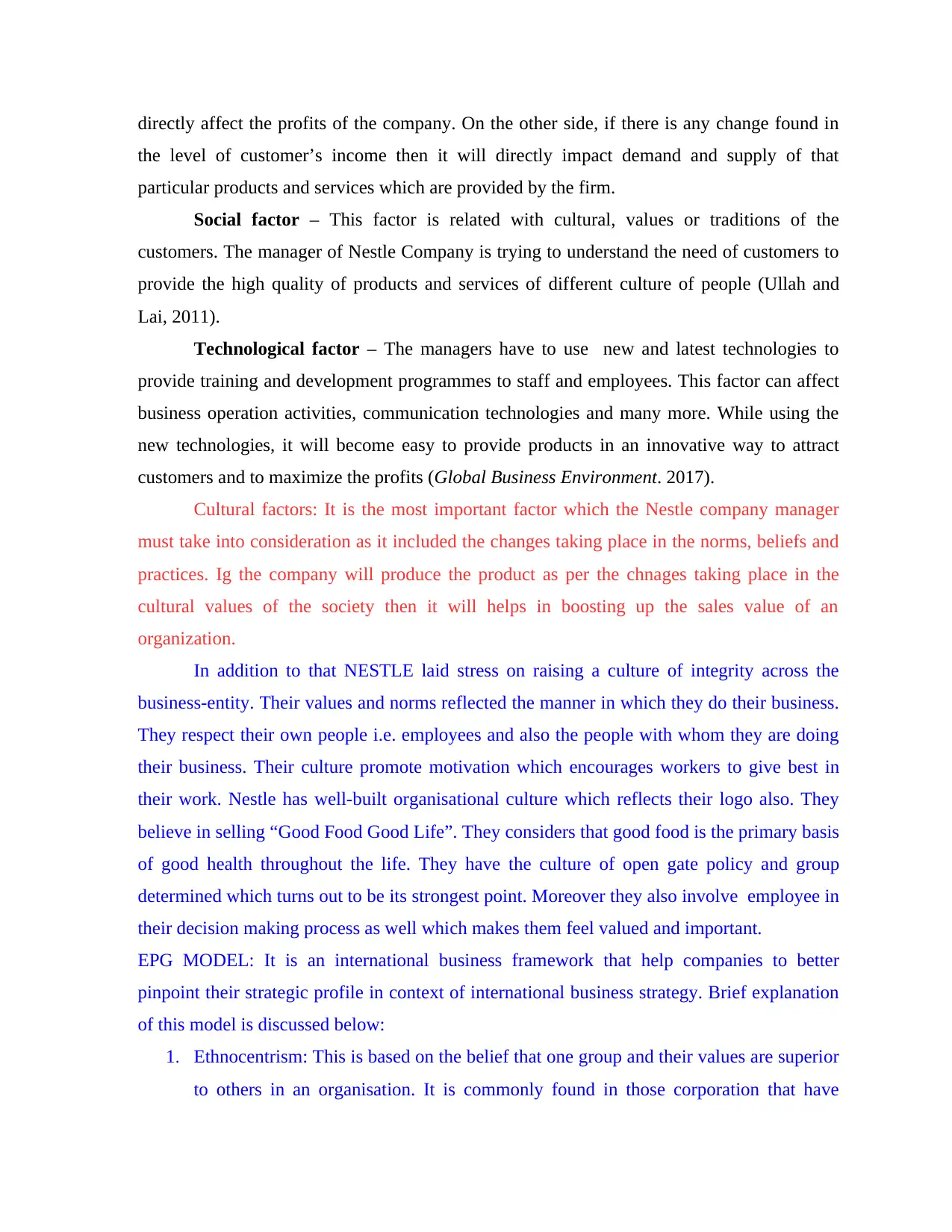
directly affect the profits of the company. On the other side, if there is any change found in
the level of customer’s income then it will directly impact demand and supply of that
particular products and services which are provided by the firm.
Social factor – This factor is related with cultural, values or traditions of the
customers. The manager of Nestle Company is trying to understand the need of customers to
provide the high quality of products and services of different culture of people (Ullah and
Lai, 2011).
Technological factor – The managers have to use new and latest technologies to
provide training and development programmes to staff and employees. This factor can affect
business operation activities, communication technologies and many more. While using the
new technologies, it will become easy to provide products in an innovative way to attract
customers and to maximize the profits (Global Business Environment. 2017).
Cultural factors: It is the most important factor which the Nestle company manager
must take into consideration as it included the changes taking place in the norms, beliefs and
practices. Ig the company will produce the product as per the chnages taking place in the
cultural values of the society then it will helps in boosting up the sales value of an
organization.
In addition to that NESTLE laid stress on raising a culture of integrity across the
business-entity. Their values and norms reflected the manner in which they do their business.
They respect their own people i.e. employees and also the people with whom they are doing
their business. Their culture promote motivation which encourages workers to give best in
their work. Nestle has well-built organisational culture which reflects their logo also. They
believe in selling “Good Food Good Life”. They considers that good food is the primary basis
of good health throughout the life. They have the culture of open gate policy and group
determined which turns out to be its strongest point. Moreover they also involve employee in
their decision making process as well which makes them feel valued and important.
EPG MODEL: It is an international business framework that help companies to better
pinpoint their strategic profile in context of international business strategy. Brief explanation
of this model is discussed below:
1. Ethnocentrism: This is based on the belief that one group and their values are superior
to others in an organisation. It is commonly found in those corporation that have
the level of customer’s income then it will directly impact demand and supply of that
particular products and services which are provided by the firm.
Social factor – This factor is related with cultural, values or traditions of the
customers. The manager of Nestle Company is trying to understand the need of customers to
provide the high quality of products and services of different culture of people (Ullah and
Lai, 2011).
Technological factor – The managers have to use new and latest technologies to
provide training and development programmes to staff and employees. This factor can affect
business operation activities, communication technologies and many more. While using the
new technologies, it will become easy to provide products in an innovative way to attract
customers and to maximize the profits (Global Business Environment. 2017).
Cultural factors: It is the most important factor which the Nestle company manager
must take into consideration as it included the changes taking place in the norms, beliefs and
practices. Ig the company will produce the product as per the chnages taking place in the
cultural values of the society then it will helps in boosting up the sales value of an
organization.
In addition to that NESTLE laid stress on raising a culture of integrity across the
business-entity. Their values and norms reflected the manner in which they do their business.
They respect their own people i.e. employees and also the people with whom they are doing
their business. Their culture promote motivation which encourages workers to give best in
their work. Nestle has well-built organisational culture which reflects their logo also. They
believe in selling “Good Food Good Life”. They considers that good food is the primary basis
of good health throughout the life. They have the culture of open gate policy and group
determined which turns out to be its strongest point. Moreover they also involve employee in
their decision making process as well which makes them feel valued and important.
EPG MODEL: It is an international business framework that help companies to better
pinpoint their strategic profile in context of international business strategy. Brief explanation
of this model is discussed below:
1. Ethnocentrism: This is based on the belief that one group and their values are superior
to others in an organisation. It is commonly found in those corporation that have
Paraphrase This Document
Need a fresh take? Get an instant paraphrase of this document with our AI Paraphraser
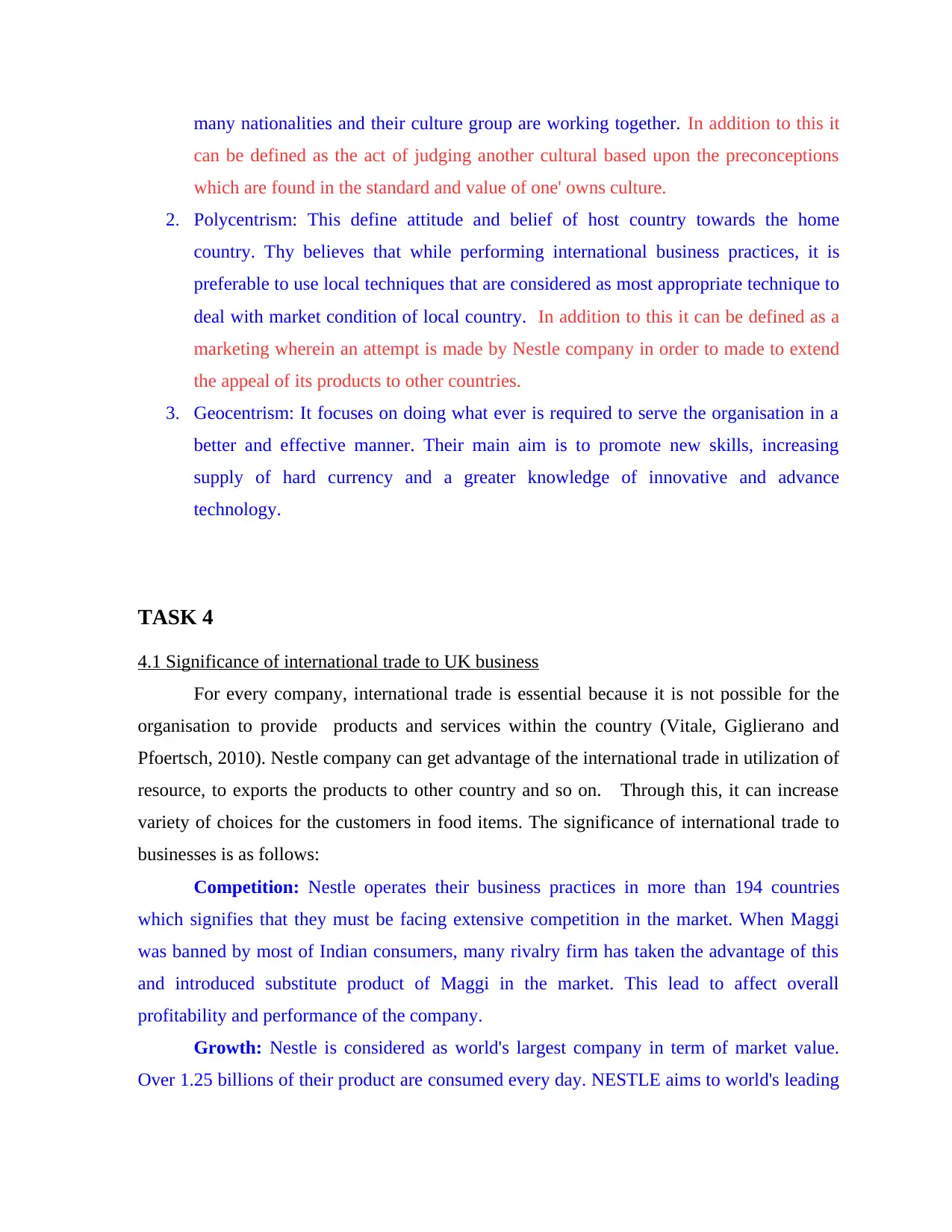
many nationalities and their culture group are working together. In addition to this it
can be defined as the act of judging another cultural based upon the preconceptions
which are found in the standard and value of one' owns culture.
2. Polycentrism: This define attitude and belief of host country towards the home
country. Thy believes that while performing international business practices, it is
preferable to use local techniques that are considered as most appropriate technique to
deal with market condition of local country. In addition to this it can be defined as a
marketing wherein an attempt is made by Nestle company in order to made to extend
the appeal of its products to other countries.
3. Geocentrism: It focuses on doing what ever is required to serve the organisation in a
better and effective manner. Their main aim is to promote new skills, increasing
supply of hard currency and a greater knowledge of innovative and advance
technology.
TASK 4
4.1 Significance of international trade to UK business
For every company, international trade is essential because it is not possible for the
organisation to provide products and services within the country (Vitale, Giglierano and
Pfoertsch, 2010). Nestle company can get advantage of the international trade in utilization of
resource, to exports the products to other country and so on. Through this, it can increase
variety of choices for the customers in food items. The significance of international trade to
businesses is as follows:
Competition: Nestle operates their business practices in more than 194 countries
which signifies that they must be facing extensive competition in the market. When Maggi
was banned by most of Indian consumers, many rivalry firm has taken the advantage of this
and introduced substitute product of Maggi in the market. This lead to affect overall
profitability and performance of the company.
Growth: Nestle is considered as world's largest company in term of market value.
Over 1.25 billions of their product are consumed every day. NESTLE aims to world's leading
can be defined as the act of judging another cultural based upon the preconceptions
which are found in the standard and value of one' owns culture.
2. Polycentrism: This define attitude and belief of host country towards the home
country. Thy believes that while performing international business practices, it is
preferable to use local techniques that are considered as most appropriate technique to
deal with market condition of local country. In addition to this it can be defined as a
marketing wherein an attempt is made by Nestle company in order to made to extend
the appeal of its products to other countries.
3. Geocentrism: It focuses on doing what ever is required to serve the organisation in a
better and effective manner. Their main aim is to promote new skills, increasing
supply of hard currency and a greater knowledge of innovative and advance
technology.
TASK 4
4.1 Significance of international trade to UK business
For every company, international trade is essential because it is not possible for the
organisation to provide products and services within the country (Vitale, Giglierano and
Pfoertsch, 2010). Nestle company can get advantage of the international trade in utilization of
resource, to exports the products to other country and so on. Through this, it can increase
variety of choices for the customers in food items. The significance of international trade to
businesses is as follows:
Competition: Nestle operates their business practices in more than 194 countries
which signifies that they must be facing extensive competition in the market. When Maggi
was banned by most of Indian consumers, many rivalry firm has taken the advantage of this
and introduced substitute product of Maggi in the market. This lead to affect overall
profitability and performance of the company.
Growth: Nestle is considered as world's largest company in term of market value.
Over 1.25 billions of their product are consumed every day. NESTLE aims to world's leading
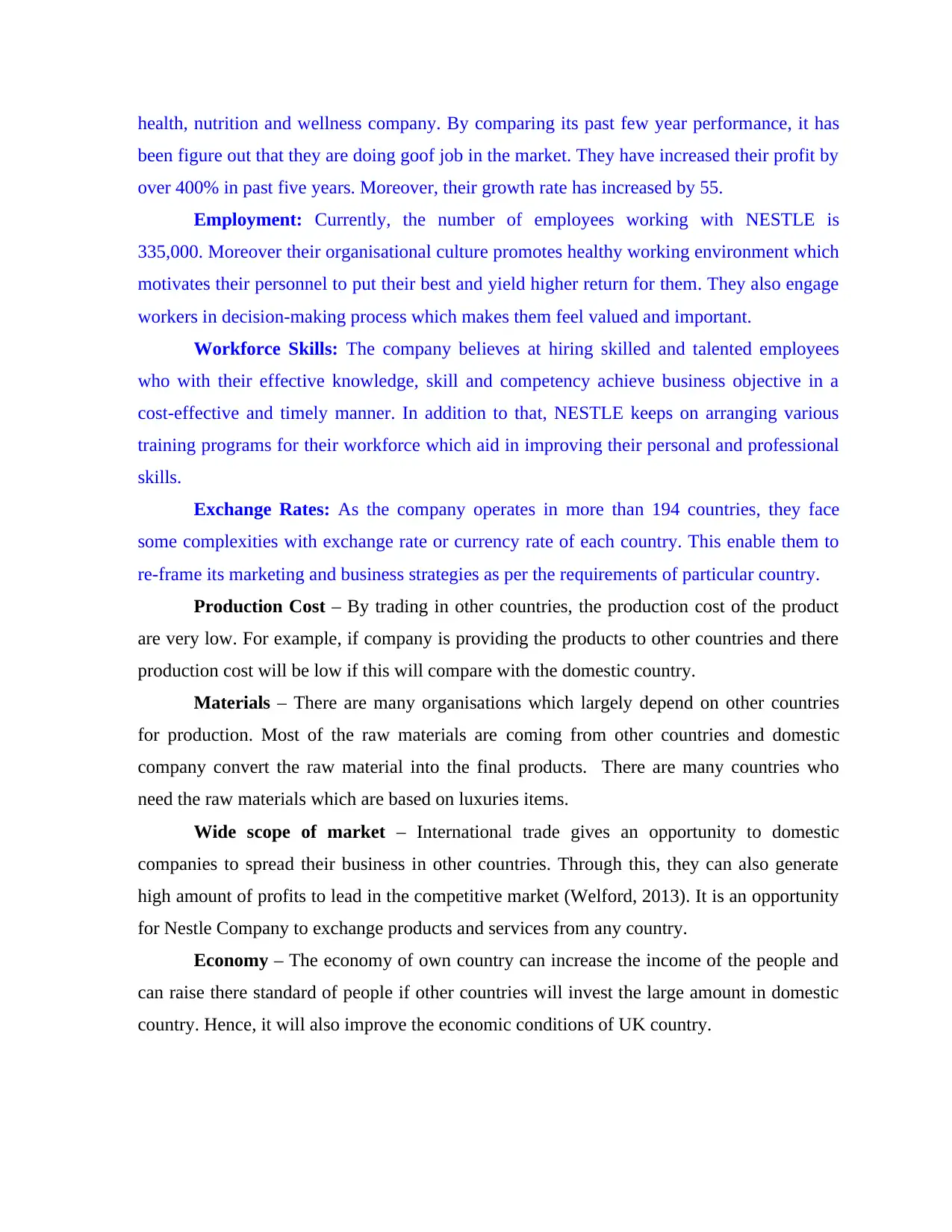
health, nutrition and wellness company. By comparing its past few year performance, it has
been figure out that they are doing goof job in the market. They have increased their profit by
over 400% in past five years. Moreover, their growth rate has increased by 55.
Employment: Currently, the number of employees working with NESTLE is
335,000. Moreover their organisational culture promotes healthy working environment which
motivates their personnel to put their best and yield higher return for them. They also engage
workers in decision-making process which makes them feel valued and important.
Workforce Skills: The company believes at hiring skilled and talented employees
who with their effective knowledge, skill and competency achieve business objective in a
cost-effective and timely manner. In addition to that, NESTLE keeps on arranging various
training programs for their workforce which aid in improving their personal and professional
skills.
Exchange Rates: As the company operates in more than 194 countries, they face
some complexities with exchange rate or currency rate of each country. This enable them to
re-frame its marketing and business strategies as per the requirements of particular country.
Production Cost – By trading in other countries, the production cost of the product
are very low. For example, if company is providing the products to other countries and there
production cost will be low if this will compare with the domestic country.
Materials – There are many organisations which largely depend on other countries
for production. Most of the raw materials are coming from other countries and domestic
company convert the raw material into the final products. There are many countries who
need the raw materials which are based on luxuries items.
Wide scope of market – International trade gives an opportunity to domestic
companies to spread their business in other countries. Through this, they can also generate
high amount of profits to lead in the competitive market (Welford, 2013). It is an opportunity
for Nestle Company to exchange products and services from any country.
Economy – The economy of own country can increase the income of the people and
can raise there standard of people if other countries will invest the large amount in domestic
country. Hence, it will also improve the economic conditions of UK country.
been figure out that they are doing goof job in the market. They have increased their profit by
over 400% in past five years. Moreover, their growth rate has increased by 55.
Employment: Currently, the number of employees working with NESTLE is
335,000. Moreover their organisational culture promotes healthy working environment which
motivates their personnel to put their best and yield higher return for them. They also engage
workers in decision-making process which makes them feel valued and important.
Workforce Skills: The company believes at hiring skilled and talented employees
who with their effective knowledge, skill and competency achieve business objective in a
cost-effective and timely manner. In addition to that, NESTLE keeps on arranging various
training programs for their workforce which aid in improving their personal and professional
skills.
Exchange Rates: As the company operates in more than 194 countries, they face
some complexities with exchange rate or currency rate of each country. This enable them to
re-frame its marketing and business strategies as per the requirements of particular country.
Production Cost – By trading in other countries, the production cost of the product
are very low. For example, if company is providing the products to other countries and there
production cost will be low if this will compare with the domestic country.
Materials – There are many organisations which largely depend on other countries
for production. Most of the raw materials are coming from other countries and domestic
company convert the raw material into the final products. There are many countries who
need the raw materials which are based on luxuries items.
Wide scope of market – International trade gives an opportunity to domestic
companies to spread their business in other countries. Through this, they can also generate
high amount of profits to lead in the competitive market (Welford, 2013). It is an opportunity
for Nestle Company to exchange products and services from any country.
Economy – The economy of own country can increase the income of the people and
can raise there standard of people if other countries will invest the large amount in domestic
country. Hence, it will also improve the economic conditions of UK country.
⊘ This is a preview!⊘
Do you want full access?
Subscribe today to unlock all pages.

Trusted by 1+ million students worldwide
1 out of 17
Related Documents
Your All-in-One AI-Powered Toolkit for Academic Success.
+13062052269
info@desklib.com
Available 24*7 on WhatsApp / Email
![[object Object]](/_next/static/media/star-bottom.7253800d.svg)
Unlock your academic potential
Copyright © 2020–2026 A2Z Services. All Rights Reserved. Developed and managed by ZUCOL.





